Working Party on Mechanics of Particulate Solids - WP MPS
Welcome to the website of the EFCE Working Party on the Mechanics of Particulate Solids.
Current activities
Excellence Award in Mechanics of Particulate Solids 2025
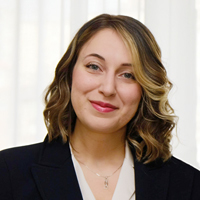
The Excellence Award 2025 will be presented to
Dr. Francesca Orsola Alfano
for her excellent PhD thesis “DEM-CFD Simulation of Fluid-Particle Flow in Carrier-Based Dry Powder Inhalers for Pharmaceutical Applications”, completed at the University of Calabria, Rende, Italy, under the supervision of Prof. Alberto Di Renzo and Prof. Francesco. P. Di Maio.
The Award will be presented at Partec 2025 in Nuremberg, Germany, 23-25 September 2025.
The Award is generously sponsored by Jenike & Johanson, Inc.
The jury also recognised the excellent work of the three runners-up: Domenica Braile
(University of Surrey, UK); Philipp Grohn (University of Kaiserslautern-Landau,
Germany); and Timo Plath (University of Twente, the Netherlands)
Press release
Spotlight TalkS
Upcoming and previous:
| Date | Topic | |
|---|---|---|
| 19 May 2025 |
Powder technology for sustainable production of battery electrodes Working Parties on Comminution and Classification and on Mechanics of Particulate Solids |
Recording (YouTube) |
| 27 November 2020 | Handling of particulate solids | Recording (YouTube) |
| 16 November 2022 |
Characterization and modelling of particulate solids flow for industrial processes |
Recording (YouTube) |
Aim of the Working Party
The main aim of the working party is the promotion of science, education and technology transfer in the subject area of bulk solids handling and transportation in the EFCE member countries. The working party promotes interaction between industry and academia to enable improvement of bulk solids handling science and technology.
Members of the Working Party
The Working Party currently has 47 members from 15 European countries: 31 members are from academia and 16 members are from industry (18 Delegates, 22 Elected Members, 7 Honorary Members and 6 Guest Members).
Delegates
Elected Members
Guests
Honorary Members
Previous Working Party Chairs:
For most of its time the Working Party on the Mechanics of Particulate Solids has been led by Dr. Jan Novosad of Czechoslovakia (later Czech Republic), laureate of the Dieter Behrens Medal in 1999.
In the period 2002 - 2007 it was led by Dr. Hermann Feise, an industrial delegate from Germany, who served as the Scientific Vice-President of the European Federation of Chemical Engineering from 2007 to 2011. Since 2018 he hold the position of President of the EFCE.

From 2008 to 2013 the Working Party has been led by Prof. Massimo Poletto from Italy.
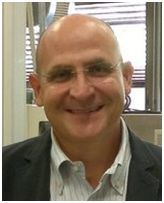
From 2013 to 2019 the Working Party has been led by Prof. Álvaro Ramírez-Gómez from Spain. Since 2020 he serves as Executive Board member for EFCE.
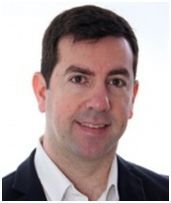
Events related to Mechanics of Particulate Solids
2022 |
WCPT9 - 9th World Congress on Particle TechnologySeptember 2022, Madrid, Spain The World Congress on Particle Technology (WCPT) is the world’s major scientific congress for particle and bulk solids technology. It is an international forum for research, technological development and innovation in new technologies. The results presented and discussed in every edition of WCPT have come from different research fields (chemical, pharmaceutical, food production, mining, agricultural, energy…) and have been beneficial for many industrial applications. Held every 4 years since its inception in 1990, is intended to stimulate discussions on the forefront of research in particle science and technology. The next World Congress on Particle Technology (WCPT9) will be celebrated in September 2022, in Madrid.
NEWS: 2018-10-29 |
2017 |
RELPOWFLO V - International Symposium Reliable Flow of Particulate Solids VSkien, Norway, 13-15 June 2017 (EFCE Event No. 734) PARMAT 2017 - International Conference on Processing, Handling and Characterization of Particulate Materialsheld in the frame of the World Congress of Chemical Engineering 2017 (WCCE10) |
Awards
Excellence Award in Mechanics of Particulate Solids
Dr. Francesca Orsola Alfano
is the winner of the 2025 Excellence Award in Mechancis of Particulate Solids. Her excellent PhD thesis “DEM-CFD Simulation of Fluid-Particle Flow in Carrier-Based Dry Powder Inhalers for Pharmaceutical Applications”, completed at the University of Calabria, Rende, Italy, under the supervision of Prof. Alberto Di Renzo and Prof. Francesco. P. Di Maio achieved the best evaluation results in terms of the technical quality of the thesis, scientific impact and industrial relevance, innovation, and dissemination of results.
The 2025 Excellence Award on Mechanics of Particulate Solids will be presented to Dr. Alfano on 24 September 2025 at the International Congress on Particle Technology - PARTEC 2025, which will be held in Nuremberg, Germany, 23-25 September 2025.
The Award is generously sponsored by Jenike & Johanson, Inc
Press release
---------
Previous Award:
The 2022 Excellence Award in Mechancis of Particulate Solids was presented to Dr. Marvellous Khala at the 9th World Congress of Particle Technology on 19 September 2022.
Award sponsor: Jenike & Johanson, Inc.
Commemorative plaque
During the celebration of the 1st International Conference on Processing, Handling and Characterization of Particulate Materials (PARMAT2017) organized by eight Working Parties of the European Federation of Chemical Engineering (EFCE) and in the frame of the WCCE10-ECCE11-ECAB4, Prof. Rimantas Kačianauskas from Vilnius Gediminas Technical University received a commemorative plaque on behalf of the Working Party on Mechanics of Particulate Solids for his outstanding contributions to the field.
Photo: Prof. Rimantas Kačianauskas (right) receiving the commemorative plaque from Prof. Álvaro Ramírez-Gómez (left), Chair of the Working Party on Mechanics of Particulate Solids of the European Federation of Chemical Engineering
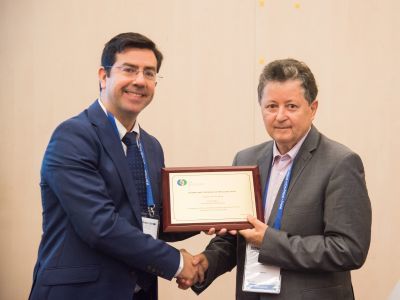
Technical Projects
NEW!
WP TASK: REFERENCE POWDER FOR SHEAR TESTING (RefP)
Building on decades of work in the field of particulate solids, the Working Party on the Mechanics of Particulate Solids (WPMPS) of the European Federation of Chemical Engineers has launched a new initiative: the development of a Standard Reference Powder (RefP) for shear testing. This effort aims to enable consistency, traceability, and cross-laboratory comparability in the measurement of powder flow properties using established devices and test protocols. It can also be used to calibrate powder flow testing devices and to train technicians. This follows an earlier project in which members of the WPMPS have helped to certify a reference powder under the BCR umbrella known as CRM-116. Since the supply of samples of this reference powder si exhausted, a new powder with certified properties is needed by academia and industry.
Led by Harald Wilms, Tim Bell, and Pablo Garcia-Trinanes, the RefP initiative targets the creation of a well-characterized powder reference material, supported by a validated testing protocol and documented environmental handling conditions. Key aspects include alignment with ASTM and BCR methodologies, consolidation load coverage (1–50 kPa), and packaging adapted to practical and cost-effective distribution.
The project is structured around collaborative contributions from volunteers and participating labs. A round robin campaign, harmonized sample preparation (including humidity conditioning), and structured documentation form the technical foundation for this effort. Updates of the progress in this project will be given during the regular working party meetings. Presentation of a fully validated shear testing protocol, including a well-characterized environmental conditioning procedure of the reference powder, is planned for the meeting during PARTEC25.
Parties interested in joining the round robin tests area asked to contact the workinig party.
This initiative marks an essential step toward unifying industrial and academic efforts in shear testing, promoting reproducibility and standardization across the global solids handling community.
Contact: Prof Dr Pablo Garcia-Trinanes (U Cadiz, Spain); pablo.garciatrinanes(at)uca.es
WP TASK: K/λ TESTING
The correct structural design of storage silos for granular solids depends on the lateral and vertical stresses that are exerted by the stored solids on the silo walls. Standard structural design specifications are reported in international design codes as Eurocode EN 1991-4:2006 [1] and in related national standards. The estimate of the load that acts on a vertical silo wall is usually performed by applying the Janssen method of differential slices [2], which requires the evaluation of the horizontal to vertical stress ratio or the lateral pressure ratio, K. An experimental device for the measurement of the horizontal to vertical stress ratio had been purposely built and tested for fine and cohesive solids [3].
Experimental campaigns in the project were dedicated:
1) to find out a reproducible procedure able to provide representative measures of the ratio of vertical to horizontal stresses which free flowing and cohesive materials;
2) to determine the principal sources of error in the experimental campaign;
3) to find out any possible improvement in the design of the cell.
References:
[1] Eurocode 1. DD ENV 1991-4 (1996).
[2] Janssen, H.A. Zeitschr. d. Vereines deutscher Ingenieure, 39, 1045-1049 (1895).
As reported by Sperl, M., Granular Matter 8, 59-65 (2006).
[3] Barletta, D. and Poletto M. Granular Matter 15, 487-497 (2013).
Contact: M. Poletto (U Salerno, IT)
WP TASKS: FLOW PROPERTIES OF BIOMASSES
Biomass
The increased use of biomass materials in industries is causing more and more handling problems, many of them associated to bottlenecks. Nowadays, there is still a lack of knowledge in the flow properties of biomass materials. The irregular shape and the elastic, fibrous, flaky, and stringy nature that present, is responsible of the completely different behaviour to those commonly found in the process industry; characterization methods are being urgently demanded. WP members are working on the study of biomass flow during the last 5 years. The initiative started in 2011 with a demonstration project called Bio4Flow, involving 4 countries. It was funded by Processum Biorefinery Initiative AB. The activities continued aiming at creating a European network on biomass handling related activities. Related projects in progress are an ITN-Marie Curie proposal titled "Efficient, reliable and safe BIOmass HAndling, Pretreatment and Processing for a sustainable EU Bio-based economy" (BIOHAPPBY) and a COST Action titled "Towards the Security of Supply of Biomass and Solid Waste Feedstock - Efficiency and Safety for the Bioeconomy (EFFSAF)". Partners from countries such as Spain, Italy, Sweden, United Kingdom, France, Germany, Portugal, Denmark, Poland, Serbia, Turkey, Israel and Australia, are participating in these initiatives. Furthermore, the debate on biomass handling problems is also pursued in forums such as the 7th International Conference for Conveying and Handling of Particulate Solids - ChoPS, September 2012, in Friedrichshafen (Germany) (roundtable discussion) or the 2nd International Symposium on Handling and Hazards, July 2014, in Madrid (Spain) organized by WP members. A significant number of industrial consultancy projects related to biomass handling issues have been already carried out. The experience gained is also being used to train specialists in this field. The PhD thesis titled ‘The effect of pellets physical properties on handling of pelleted biomass fuels in practical use’ is being written up by M Abdulmumini. This research has been funded by PTDF, Nigeria and has been undertaken in collaboration with Forever Fuels Ltd.
Contacts: Diego Barletta (U Salerno, IT), Sylvia Larsson (SLU, SE), Robert Berry (U Greenwich, UK), Álvaro Ramírez-Gómez (UPM Madrid, SP)
WP TASK: WALL FRICTION PROJECT
Prior investigations by the Working Party encountered considerable scatter in the results of wall friction tests obtained by various experienced bodies testing bulk materials on contact surfaces that were carefully selected to have common properties. An initial series of tests will be conducted by UK participants and a preliminary examination made of the reports and test results to review the suitability of the process, procedure and presentation of results.
Contact: L. Bates (Ajax Equipment, Bolton, UK)
WP TASK: VALIDATION OF DEM SIMULATION
The WPMPS workshop endeavors to increase the acceptance of DEM-codes for simulation of bulk solids behavior. This requires the codes to be validated, which in turn needs carefully selected problems with a good experimental database for test runs. As an initial step a workshop shall produce a framework for engagement between academic researchers, professional software companies and potential industrial beneficiaries of DEM numerical simulations and identify areas that need significant further development both in terms of computational methodologies as well as the experimental validation procedures. It is hoped that in the longer term, the group of researchers brought together for the event will form the nucleus of a wider project formation aimed at setting the European/International standards of "best practice" in DEM Simulation software development and implementation in a broad range of industry sectors. Projects developed in this direction were PARDEM - PARticle Systems: Training on DEM Simulation for Industrial and Scientific Applications, an EU Funded Framework 7, Marie Curie Initial Training Network (2009-2013), and T-MAPPP - Training in Multiscale Analysis (MA) of multiPhase Particulate Processes and systems (PPP) also an Initial Training Network funded by FP7 Marie Curie Actions ITN (2014-2018).
Contacts: S. Luding (TU Delft, NL), J. Ooi (U Edinburgh, UK) and U. Tuzun (U Surrey, UK)
WP TASK: GUIDE TO THE SPECIFICATION OF BULK SOLIDS FOR STORAGE AND HANDLING CONTRACTS
Much information is available on the properties of bulk material, but broad industrial experience indicates that there is often inadequate appreciation of the characteristics that are relevant to the satisfactory performance of solids handling equipment in the formation of a contract between the purchaser and supplier. The British Materials Handling Board has undertaken to remedy the deficiency by preparing a 'Guide to the Specification of Bulk Solids for Storage and Handling Applications'. The Working Party endorsed this initiative and looks to co-operate with a view to attaining European acceptance of the document as a working tool for agreeing the requirements between user and supplier of the value of relevant physical properties of bulk materials that are to be used in any solids storage and/or handling project. This Guide is in preparation for draft circulation.
Contact: L. Bates (Ajax Equipment, Bolton, UK)
WP TASK: STANDARD SHEAR TESTING TECHNIQUE (SSTT)
Since 1969 the characterization of bulk solids has been the focus of the work of the "Working Party on the Mechanics of Particulate Solids" of the European Federation of Chemical Engineers. Led by John Williams and Jan Novosad the WPMPS developed the first international standard on the measurement of the flow properties of bulk solids during the 1970's and 80's. After its publication in 1989 this "Standard Shear Testing Technique for Particulate Solids Using the Jenike Shear Cell" or SSTT became the common worldwide basis for silo design. Globalization has made us feel that anything documented in internationally accessible standards must be usable for everybody. However, the knowledge about proper shear testing spreads only slowly through the educated world. It is my believe that one reason for this unsatisfactory state remains the language barrier. Therefore, after the German translation published in 2005, now a Czech edition of the SSTT has been prepared.
Contact: J. Zegzulka (U Ostrava, CZ)
Publications
IChemE, EFCE:
Standard Shear Testing Technique for particulate solids usingthe Jenike shear cell (SSTT)
A report from the EFCE Working Party on the Mechanics of Particulate Solids,
Rugby, Warwickshire, UK (1989), ISBN 0-85295-232-5
Introduction
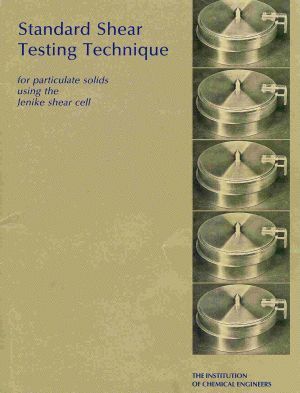
Bates, L.:
Glossary of Terms in Powder and Bulk Technology
The British Materials Handling Board, Sale Cheshire (2002),
http://www.bmhb.co.uk
Introduction
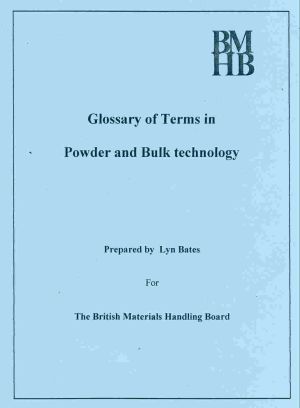
Feise, H.J. [Übs.]:
Standardmethode zur Charakterisierung von Schüttgütern mit dem Jenike Schergerät
EFCE Working Party on the Mechanics of Particulate Solids,
DECHEMA, Frankfurt/Main, D (2005), ISBN3-89746-058-0
Vorwort
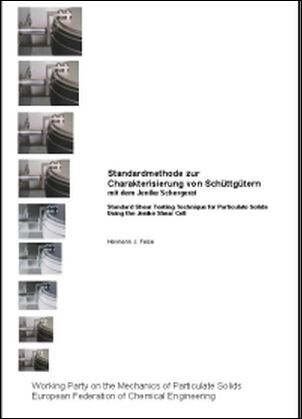
Zegzulka, J. [Übs.]:
Standard smykové zkousky partikulárních hmot pomocí Jenikeho smykového stroje
EFCE Working Party on the Mechanics of Particulate Solids,
VSB-TU Ostrava, Ostrava (2006), ISBN 80-248-1051-4
Vorwort/Preface
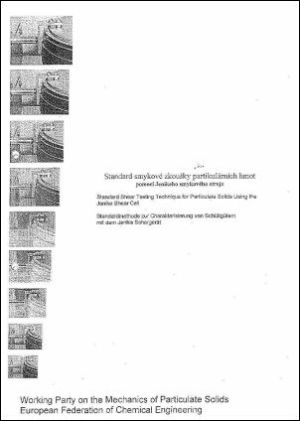
Carson, J.W.; Wilms, H.:
Development of an international standard for shear testing
Powder Technology, Volume 167, Issue 1, 6 September 2006, Pages 1-9
Useful links
This page list a large number of research groups working on the wider area of Mechanics of Particulate Solids.
The list is certainly not complete. Suggestions for additional links are very welcome.
The Working Party on the Mechanics of Particulate Solids does not imply any judgement on the quality of the website or the research group listed.
Belgium
Germany
- Leibniz Institute for Agricultural Engineering and Bioeconomy (ATB)
- TU Freiberg
- Schulze Schüttgutmesstechnik
- TU Kaiserslautern
- Karlsruher Institute for Technology, Institute of Mechanical Process Engineering and Mechanics
- Uni Würzburg, Institute for Pharmacy and Food Chemistry
- TU Braunschweig, Institute for Particle Technology
- Universität Magdeburg
- Bergakademie Freiberg
- TU München, School of Life Sciences Weihenstephan
- Uni Erlangen, Institute of Particle Technology
- Leibniz Universität Hannover, Laboratory of Nano and Quantum Engineering
- Uni Halle-Wittenberg, Mechanical Process Engineering
- TU Chlausthal, Institute of Particle Technology
Denmark
France
Hungary
- University of Pannonia, Research Institute of Biomolecular and Chemical Engineering
- Budapest University of Technology and Economics
Italy
Israel
Lithuania
Norway
Netherlands
Poland
Russia
- Moscow State Academy of Chemical and Environmental Engineering
Sweden
United Kingdom
- University of Sheffield
- Brunel University
- University of Birmingham
- The Open University
- Wolfson Centre at University of Greenwich
- University of Leeds
- University of Edinburgh
- University of Surrey
- Glasgow Caledoian University
- Imperial College
Australia
Japan
South Africa
United States of America
to be continued
Previous acivities
History
The working party was founded in 1969. Since then it has run numerous technical projects mainly concerning the characterisation of bulk solids for flow. Its most prominent outcome being the SSTT (Standard Shear Testing Technique for Particulate Solids Using the Jenike Shear Cell). This document has become the basis of several standards, most notably those by ASTM on Jenike and Ring Shear Testing.
For most of its time the Working Party on the Mechanics of Particulate Solids has been led by Dr. Jan Novosad of Czechoslovakia (later Czech Republic). In the period 2001 - 2007 it was led by Dr. Hermann Feise, an industrial delegate from Germany, from 2008 to 2013 by Prof. Massimo Poletto from Italy and from 2013-2019 by Prof. Álvaro Rámirez- Gómez from Spain. Since 1 January 2020, the Working Party is headed by Prof. Diego Barletta, University of Salerno, Fisciano, Italy. The working party currently has 47 members from 15 European countries.
Abstracts from Minutes of Working Party business meetings
- WPMPS Business Meeting in Nuremberg, Germany on 8 April 2019
- WPMPS Business Meeting in Greenwich, United Kingdom on 10 September 2018
- WPMPS Business Meeting in Skien, Norway on 12 June 2017
- WPMPS Business Meeting in Nuremberg, Germany, on 18 April 2016
- WPMPS Business Meeting in Tel Aviv, Israel, on 3 May 2015
- WPMPS Business Meeting in Prague, Czech Republic, on 23 August 2014
- WPMPS Business Meeting in Nuremberg, Germany, on 24 April 2013
- WPMPS Business Meeting in Friedrichshafen, Germany, on 9 September 2012
- WPMPS Business Meeting in Berlin, Germany, on 25 September 2011
- WPMPS Buiness Meeting in Nuremberg, Germany, on 25 April 2010
- WPMPS Business Meeting in Brisbane, Australia, on 3 August 2009
- WPMPS Business Meeting in Tromso, Norway, on 9 June 2008
News 2016
Bulk Solids Centre Czech Republic (BSC)
The European Federation of Chemical Engineering (EFCE) godfathered the Bulk Solids Centre Czech Republic (BSC) providing during all this time advice, guidance and experience through the Working Party on Mechanics of Particulate Solids (WPMPS). This new workplace in the Czech university is an open space for international collaborations across Europe and beyond in fields associated with bulk solids handling. Here, you will find a research group plenty of energy and enthusiasm headed by Prof. Jiri Zegzulka, internationally recognised for his expertise in this field, with modern facilities, tools and equipment to face new challenges.
The opening ceremony of BSC was on 8th April 2016 in the Innovation Centre VSB-TU Ostrava. The Working Party on Mechanics of Particulate Solids of EFCE represented by its chairman Prof. Álvaro Ramírez-Gómez opened the centre.
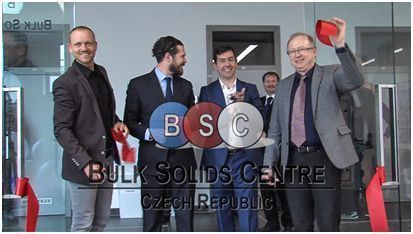
The opening ceremony (from the left): Assoc. Prof. S. Mišák,
Assoc. Prof. A. Király, Prof. Dr. Á. Ramírez-Gómez, Prof. Dr. J. Zegzulka
Members area
The following pages are restricted to members of the EFCE Working Party (EFCE Section).
EFCE is working with the DECHEMA Community-Tool. If you attended former events of the EFCE (e.g. WCCE10, Loss Prevention 2019) or DECHEMA, your address may be registered already. Please fill in these login details below.